Myanmar is on the edge of a state collapse nearly 11 months after a military coup. Violence and insecurity have followed the coup, while the country is also suffering greatly from COVID-19 and a resulting economic crisis. Former State Counsellor Aung San Suu Kyi, who lived under house arrest for nearly 15 years in the 1990s and the early 2000s, might be spending many more years in detention after the junta sentenced her to two years in prison, while still facing additional charges. But the Southeast Asian country of 54 million people is slipping away from headlines, as other important global issues are occupying the world’s attention. Meanwhile, Myanmar seems to have fully returned to autocracy, showing little hope for the freedom of its citizens.
What can the international community do to resolve the political crisis in Myanmar? Western countries have already imposed targeted sanctions on junta members, including freezing their assets in foreign bank accounts and restricting their access to visas. But they are struggling to change the junta’s course as its State Administration Council (SAC) was smart enough to court China and Russia, both of which have continued to undermine the West’s efforts to pressure the military regime. While China is unhappy with the political instability created by the coup, it has not openly sided with the rival National Unity Government (NUG). Meanwhile, the Myanmar army’s relationship with Moscow has reached an all-time high. The international community thus does not have much leverage to address the political crisis in Myanmar, but they can still do at least three things to help the country.
Bring all parties to the negotiation table
The junta’s SAC is resolute to gain complete and total power by any means necessary – even if that means killing civilians. The NUG believes that only an armed revolution could stop the junta, so it launched the “People’s Defensive War” against the Tatmadaw, the Myanmar’s armed forces. Both parties are determined to defeat the opposite side in a civil war. But violence is not — and should not — be the answer to settle this dispute, especially when the conflict has reached a stalemate. The outside world must help foster a return to a democratic path in Myanmar through a peaceful resolution because it has invested so much in the country in the past 10 years supporting the democratic transition. The Association of Southeast Asian Nations (ASEAN) reached a five-point consensus with the coup leaders in April, which included immediately ceasing the violence and beginning a constructive dialogue among all parties. So far, the SAC is not keen to implement the ASEAN consensus. To be fair, the NUG is not interested in engaging in a dialogue process either. The opposition movement wants to remove the Tatmadaw from power once and for all.
Both sides are trying to get the control of the country, but before this fierce competition ends, Myanmar could fall to pieces. A large part of the country has already been a battleground for numerous fights between the military and resistance groups, and the human and economic costs of a civil war would be astronomical. The outside world must pressure and persuade both the SAC and the NUG to come to the negotiation table. The junta is paranoid with anti-Western sentiments, and it does not have much respect for ASEAN either. But the generals are comfortable with some global figures, such as Bill Richardson of the United States and Yōhei Sasakawa of Japan. Both visited Myanmar in November, and they should continue talking to the top brass. Quiet diplomacy by global statesmen whom the junta seems to trust could perhaps persuade the generals to negotiate. Similarly, the West needs to convince the NUG that political dialogue is a way forward. China holds much leverage on both sides, so it is essential to have Beijing on board in this negotiation process as well.
Provide humanitarian assistance
Myanmar is experiencing one of the worst crises since its independence. Fighting with several ethnic armed organizations resumed after the coup. The NUG and its military wing, the People’s Defense Forces (PDFs), along with various armed resistance groups, are carrying out guerrilla warfare against the Tatmadaw. The junta seems determined to destroy the PDFs. As in conflict areas in the past, the Myanmar military is now committing human rights violations against combatants and civilians. Violence has forced hundreds of thousands to flee their homes. On top of that, a new wave of COVID-19 in July and August killed thousands more and paralyzed the country’s health care system. Compared to other countries in the region, Myanmar has low levels of vaccination coverage, which leaves it vulnerable to future COVID-19 waves. Furthermore, the twin crisis of the coup and the pandemic are severely impacting an economy that is expected to contract around 18% this year, according to the World Bank. The United Nations emergency relief coordinator said that three million people across Myanmar need life-saving humanitarian assistance because of rising conflict and insecurity, the pandemic, and a failing economy.
The international community must work with the U.N. and NGOs to provide humanitarian aid to Myanmar. As Richardson told The New York Times, 54 million people should not suffer because of the political crisis of the military takeover. The world can help by providing COVID-19 vaccines, offering assistance to internally displaced persons, and contributing economic support to small businesses and the poor. There is a risk that delivering aid to Myanmar allows the Tatmadaw to claim credit and bolster its domestic support. To avoid this risk and not legitimize the junta and entrench military rule, the donor community needs to consult with local civil society organizations (CSOs) and international development organizations inside Myanmar to develop an effective aid strategy.
Engage with the Tatmadaw
During Myanmar’s democratic transition, the Western governments and NGOs poured millions of dollars into the country to build the capacity of local CSOs and nurture political and social activists. They are now at the forefront of the resistance movement against the coup. Western nations, however, failed to engage with the Tatmadaw. When Myanmar enjoyed greater freedom and prosperity, soldiers did not have many opportunities to interact with the world outside of their own institution, and military propaganda was reinforced to them through training and other means of indoctrination. Social media, particularly Facebook, fueled political polarization in Myanmar, creating intense fights between Tatmadaw supporters and Aung San Suu Kyi fans on the internet. Even though the military has sent thousands of officers to Russia for graduate studies, they are still cementing authoritarian mindsets due to a lack of exposure to democratic education.
To change Myanmar, the Tatmadaw must be changed. The international community should start thinking about engaging with Myanmar’s military after the current political turmoil ends. Whatever the outcome of the present crisis, it is likely that the Tatmadaw, as the country’s strongest institution, will still be there. Engaging with the Tatmadaw is thus required, but it does not mean lifting existing arms embargos or transferring military technology to Myanmar. Western countries should provide norm transmission and diffusion through international exposure and education related to democratic values. Offering the Tatmadaw training on democracy, human rights, and leadership should be considered. Even teaching English to Burmese military officers would be a good start. The United States, the United Kingdom, and other countries tried these initiatives briefly, though they all ended after the Rohingya crisis broke out in 2016-2017. This time, the West should put more effort into helping to integrate the Tatmadaw into the international arena to end their isolation. Reforming an authoritarian army entrenched in power for decades — with a record of human rights violations — will take time, of course. But with patience and the right strategy, it is worth trying.
The path to peace
The ongoing political crisis in Myanmar has no end in sight. The hard-won democratic achievements of the last 10 years have disappeared. No one knows what the future will look like. But an armed revolution might not be a wise idea, given the brutal counterinsurgency history of the Tatmadaw. The international community should bring all parties to the negotiable table to start constructive dialogues to achieve a peaceful resolution. Global statesmen should continue quiet diplomacy to persuade the generals to stop violence and perhaps finally agree to talk with the democratic movement. The NUG could come to the negotiation table when they realize that armed revolution cannot topple the military regime. Humanitarian aid must be delivered to the poor and most vulnerable groups inside the country and along the border. As a long-term solution, the West should engage with the Tatmadaw to reform it as a professional army by discouraging their isolation and giving them access to a liberal education.
The world should not give up on Myanmar.
-
Acknowledgements and disclosures
The author would like to thank the Asia Pacific Team from the Defence and Security Foresight Group (DSFG) for their support during the development of this piece.
The Brookings Institution is committed to quality, independence, and impact.
We are supported by a diverse array of funders. In line with our values and policies, each Brookings publication represents the sole views of its author(s).

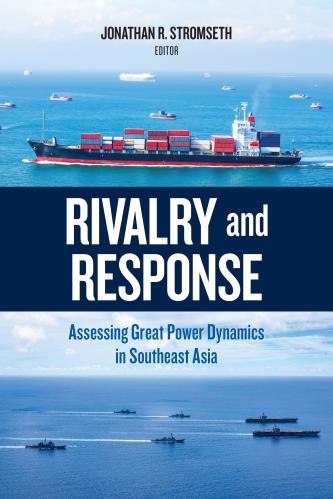

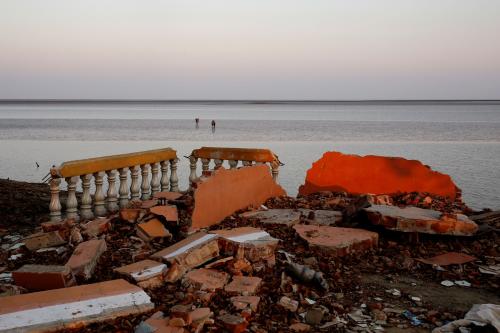
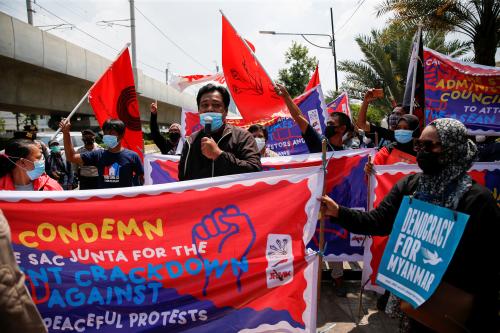
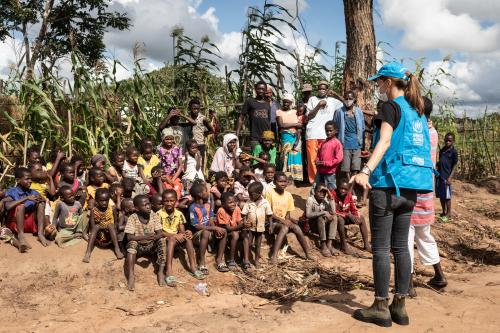


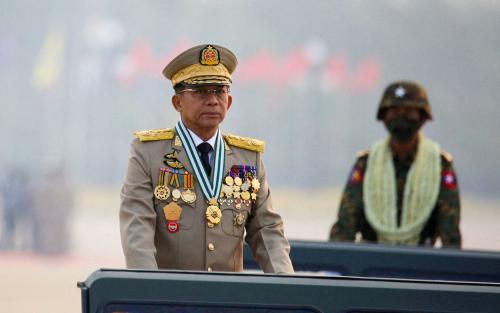
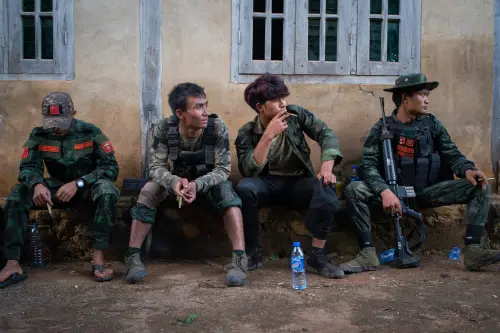
Commentary
Don’t give up on Myanmar
December 16, 2021